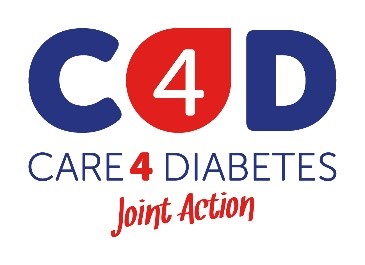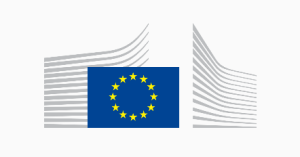
Official website: www.c4djointaction.eu
Project Description:
The CARE4DIABETES Joint Action project aims to support cooperation between Member States in the development of structured programs for the education of people with type 2 diabetes with the aim of long-term lifestyle improvement (diet, movement, rest and relaxation) including digital approaches, whereby for the transfer of knowledge and experience of Dutch good practice Voeding Leeft (https://voedingleeft.nl/). 12 countries participate in it. In Slovenia, the extraordinary importance of effective and successful education for improving the health of people with type 2 diabetes has been recognized for decades and included in national professional guidelines (https://endodiab.si/priporocila/diabetologija/smernice-za-vodenje-sladkorne-bolezni/) and recommendations (https://e-diabetes.si/priporocila/). The purpose of participating in C4D for Slovenia is to develop and evaluate an effective and successful structured educational program that will be based on Slovenian professional guidelines and that will also include digital approaches. In normal clinical practice, all these approaches are already implemented in a fragmented way, but in a less structured way and above all without systematic feedback on how they could be made more effective. The challenges that the future brings us are, on the one hand, an increasing number of people with type 2 diabetes with increasingly complex needs, and on the other hand, a drastic reduction in human capacities in healthcare. Participation in this project from the point of view of responding to the challenges of the future is guided by the strategic document of Slovenia – National Program for the Control of Diabetes 2020-2030 (https://www.obvladajmosladkorno.si/). The coordinating group at the Ministry of Health, which oversees its implementation, is a key stakeholder in this research.
The purpose of the pilot practice in Slovenia (Novo mesto General Hospital) within the CARE4DIABETES (C4D) project is to increase the capacity and quality of education at the secondary level of health care, which will be supported by new content, approaches and digital tools. The central goal is to increase the effectiveness of existing resources for providing education in the management of type 2 diabetes. In addition, participation in C4D in the wider Slovenian context serves as a unique opportunity to introduce approaches from the fields of development, testing, monitoring and evaluation of (digitally supported) educational programs, with with the goal of optimizing efficiency in accordance with the needs of people with diabetes and the availability of human resources, and last but not least, the development of a proposal for updating the existing DMS training system of educators and doctors for the implementation of education with upgraded and digitally supported approaches.
Phases of the project and their implementation:
The work will be conducted in 7 work packages (WP).
WP 1 – Project management & coordination: To manage the project and ensure results are reached. To guarantee a continuous exchange of information among partners. To organise meetings appropriately. To supervise data management and ethical issues stemming from project activities.
WP 2 – Communication and dissemination: To ensure results and deliverables of the JA are known by the general public. To actively engage stakeholders in the project. To define dissemination strategy and related key performance indicators. To implement a wide range of media and non-media communication. To ensure dissemination and to evaluate the impact. To favour the knowledge of the CARE4DIABETES pilot actions’ experiences, and other relevant results in the EU and beyond
WP 3 – Evaluation: To monitor and evaluate the project activities, collect information, and ensure actions are conducted as planned. To develop and implement relevant impact indicators and a methodological framework, in order to oversee and evaluate impartially the progress made.
WP 4 – Sustainability: To identify general principles of sustainable implementation, based on the analysis of the best practice experience. To define the essential elements of the process of transferability adaptation to facilitate the long-term sustainability of the pilot actions. To support development of recommendations at EU level.
WP 5 – Preparatory actions: To perform all preparatory actions for the best practice’s implementation. To have a thorough understanding of the best practice features. To establish a detailed plan for transferring in each relevant Member State. To prepare the online community platform to complement patients’ lifestyle training sessions on WP6 to produce an overall framework and guiding material for patients’ recruitment
WP 6 – Phase I implementation (capacity building
oriented): To transfer, adapt, and translate materials for patients’ lifestyle treatment. To train the healthcare professionals in charge of local pilot actions. To conduct the first intensive care phase of the intervention in the 12 countries including two PDSA cycles. To continuously monitor and evaluate the progress and interim results to correct potential bottlenecks
WP7 – Phase II implementation (after-care oriented): To prepare and execute after-care implementation, with the two patients’ intervention group and including one PDSA cycle. To perform a close follow-up on patients after the intensive training programme of WP6. To implement dedicated after-care activities including continuous tracking and support of enrolled patients. To develop a health and socio-economic impact assessment about how transfer and implementation of the best practice was done.
Added Value
The aim of work package 4 (WP/4), which is led by NIJZ, is to achieve a long-term impact on project results, together with the extended continuation of pilot measures and the development of recommendations at the EU level. General principles will be defined, based on previous best practice experiences gained from the CARE4DIABETES project. They will aim to identify and build the potential EU and national added value of the joint action project, encourage wider implementation of key successful best practice features, promote networking and capacity building in relation to innovative approaches to the management of diabetes and non-communicable diseases in general. All project partners, HADEA agency representatives and other stakeholders will be involved in this task.
Expected Results and Material:
By participating in Work Package 5 (WP/5), NIJZ enabled the consortium to gain an in-depth understanding of Dutch Reverse Diabetes2 Now best practice and review national/regional contexts and identify key stakeholders to participate. A detailed description of how the program was implemented step by step, with the necessary resources and capacities, obstacles and solutions to problems, was included in document D5.1. prepared by NIJZ. With a comprehensive description of best practice, a description of national/regional contexts and lists of stakeholders prepared by each pilot country, together with suggestions and guidance for the development of country-specific implementation plans, this document will help pilot partners to better understand and meet the requirements for adopting good practice . NIJZ will also prepare proposals for the inclusion of partners’ plans in pilot actions and other material with guidelines for implementation, monitoring and evaluation in their countries.
In work package 4 (WP/4), NIJZ will identify general principles of sustainable implementation based on the analysis of characteristics and experiences of best practice, and define the essential elements of the transferability adaptation process to establish the long-term sustainability of the pilot campaign. The main task of this work program is to develop an appropriate methodology and support the participating countries in a structured process of implementation of the practice and to ensure their sustainability. A further task is the identification of general principles for the sustainability of implemented practices with the preliminary development of a methodology for the inclusion of these elements in all phases of the PDSA (Plan-Do-Study-Act) and final reporting, including proposals and webinars and periodic and final reports of pilots.
Project Duration: 1st of February 2023 – 31th of January 2026.
Supporting Organisation: Asturias Ministry of Health (CSPA), Spain
Project partners: National Institute of Public Health (NIJZ)
Funding: European Commission, EU4Health Program (EU4H)

Photos from events:
Photos from the C4D General Assembly meeting, 22-23 February 2024 in Hague


